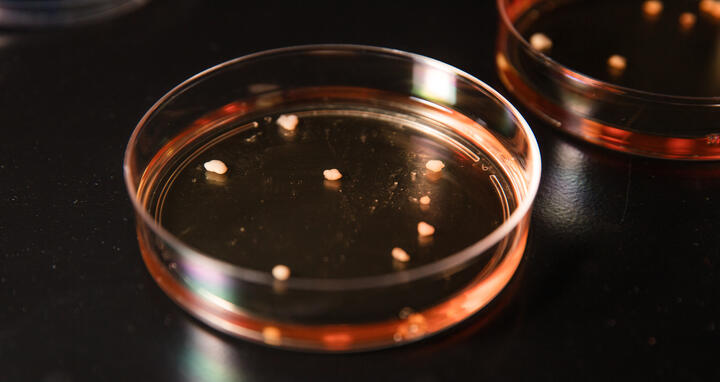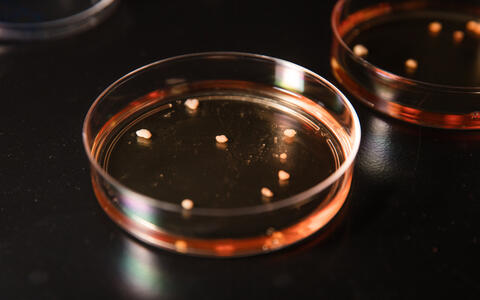Cooking, storytelling, and experimenting: The MDC at Berlin Science Week
Organoids in a petri dish.
Cooking for the microbiome is all about the inhabitants of our intestines. Trillions of microorganisms live there and keep us healthy. Why are they so important? And can we cook for a healthy microbiome? On this evening at Pastamadre, where science meets culinary art, the participants can experience how the microbial community in the intestine functions - and learn how to use microorganisms themselves when cooking. Scientists and fermentation artisans will present the latest in microbiome research, food chemistry and healthy nutrition.
1 November, 5-10 p.m., Groninger Str. 48, Berlin, contribution 29 Euro (incl. food and beverages), English, registration required
Researchers from the MDC and Berlin Animal Welfare Officers will be on hand at the Urania to answer questions about animal experiments. In short lectures, four scientists will present which animal experiments they are carrying out and why they are necessary for their work. In the subsequent panel discussion, they will also debate if and how an alternative method could replace an animal experiment, or why it cannot.
5 November, 8-9:30 p.m., Urania Berlin, An der Urania 17, Berlin, free of charge, German, registration requested
Stories about science
With EUREKA!!! - Stories of Discovery the MDC and the storytelling show "The Bear" bring very special stories on the stage boards of Pfefferwerk: scientists tell stories about their mishaps, mistakes and of moments of truth.
1 November, 8-10:30 p.m., Pfefferwerk, Christinenstr. 18/19, Berlin, Tickets 10 (reduced 8) Euro, bilingual, event page with link to ticket purchase
The cell is the focus of the show I know something you don't know at Umspannwerk Ost. Researchers from the MDC surprise the audience with interesting facts. At the end of the evening, the guests will decide: Who has told them something really new - and how useful is this knowledge?
November 2, 8:30 – 10 p.m., Umspannwerk Ost, Palisadenstraße 48, Berlin, English, registration requested
Open Science and citizen dialogue
The workshop Why Everyone Should Care About Open Science deals with the question why the Open Science movement is important for science and society and how it can be better used. First, main areas such as Open Data and Citizen Science will be presented, followed by an interactive discussion game where participants can outline their own ideas.
4 November, 6-8 p.m., MDC Berlin-Mitte (BIMSB), Hannoversche Str. 28, Berlin, English, registration required
Technologies such as genome editing make longevity seem attainable. Finnish artist Emilia Tikka is interested in what this would mean for our society. In her work ÆON. Trajectories of Longevity and CRISPR, she constructs a poetic scenario of a possible future, asking "Would you inhale daily to stay young?“ The installation is exhibited at MDC Berlin-Mitte in November. ÆON is the result of the first European artist residency on genome editing. In 2018, Tikka spent three months in MDC labs, exploring with researchers how CRISPR-Cas9 could change our world. The residency was initiated by the Max Delbrück Center, together with STATE, and funded by the EU project ORION as a first step towards a Europe-wide citizen dialogue on CRISPR.
8 - 29 November, 10 a.m. - 6 p.m., MDC Berlin-Mitte (BIMSB), Hannoversche Str. 28, 1. OG, Berlin
Laboratory in the underground station
"Mind the Lab" will be the motto in five Berlin underground stations, where researchers from various institutes will present exciting insights into science in pop-up laboratories. The MDC will also be there, you will meet our researchers at Alexanderplatz station (U-Bahnhof). There, the LifeTime initiative, coordinated by the MDC, showcases groundbreaking single cell biology technologies in simple experiments. Scientists will also present their work with organoids, those tiny, self-organized three-dimensional tissue cultures that could change how we diagnose and treat diseases.
7 November, 2-8 p.m., Alexanderplatz underground station, Berlin, German
The MDC is also involved in the research congress Future Medicine 2019, this year's focus: translational medicine. In three-minute presentations, around 80 top-class scientists will give insights into their work - and into what the future of medicine could look like.
7 November, 9 a.m.-6.30 p.m., Kosmos, Karl-Marx-Allee 131A, Berlin, English, registration required
Further information
Contact
Jutta Kramm
Head of the Communication Department at MDC
+49(0)30-9406-2140
Jutta.kramm@mdc-berlin.de or presse@mdc-berlin.de
- The Max Delbrück Center for Molecular Medicine (MDC)
-
The Max Delbrück Center for Molecular Medicine in the Helmholtz Association (MDC) is one of the world’s leading biomedical research institutions. Max Delbrück, a Berlin native, was a Nobel laureate and one of the founders of molecular biology. At the MDC’s locations in Berlin-Buch and Mitte, researchers from some 60 countries analyze the human system – investigating the biological foundations of life from its most elementary building blocks to systems-wide mechanisms. By understanding what regulates or disrupts the dynamic equilibrium in a cell, an organ, or the entire body, we can prevent diseases, diagnose them earlier, and stop their progression with tailored therapies. Patients should benefit as soon as possible from basic research discoveries. The MDC therefore supports spin-off creation and participates in collaborative networks. It works in close partnership with Charité – Universitätsmedizin Berlin in the jointly run Experimental and Clinical Research Center (ECRC), the Berlin Institute of Health (BIH) at Charité, and the German Center for Cardiovascular Research (DZHK). Founded in 1992, the MDC today employs 1,600 people and is funded 90 percent by the German federal government and 10 percent by the State of Berlin.






